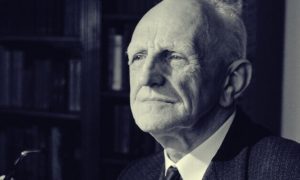Donald Winnicott and His Theory about the False Self

Donald Winnicott was a famous psychiatrist, psychoanalyst, and English pediatrician who developed an interesting approach to the human personality. Due to his training as a pediatrician, he focused his thoughts, reflections and theories on children. And, in particular, on the relationship between the mother and baby, and the consequences of this relationship. Apart from this, he also developed the interesting theory of the false self.
He worked together with the famous psychoanalyst Melanie Klein, and even treated one of his own children with her. He was also president of the British Psychoanalytic Society and a very famous thinker of the twentieth century.
“With games, and only with games, can the child or the adult create, and use their whole personalities, and the individual only discovers his personality when he becomes a creator”.
-Donald Winnicott-
During his life, he also put forward the concepts of “good enough mother” and “ordinary devoted mother”. In the same way, his concept of the “transitional object” , something that many schools of psychology have adopted.
The relationship between mother and baby, according to Winnicott
In line with other psychoanalysts, Winnicott states that, during the first year of life, the mother and child constitute a unit. You can’t talk about the baby as an entity that is separate from their mother, he says. The two form an indivisible psychic unit.

Winnicott says that the mother is the first “context” a human being has. She is the total basis of its subsequent development. Therefore, and especially in the first months of life, the mother is the baby’s universe. The mother is practically synonymous with the world.
Then Winnicott’s concept of the “good enough mother” appears. She provides the necessary care for the baby, spontaneously and sincerely. She is willing to be everything that the child needs. As a mother, she isn’t perfect, but she doesn’t neglect the baby, nor does she overprotect him. This helps to create the true self.
Meanwhile, the “ordinary devoted mother” is one who is excessively attached to or overly-protective of her child. She isn’t able to respond adequately to the spontaneous needs of the child. This gives rise to what Winnicott calls the false self.
Winnicott and the false self
The mother is like a mirror for the child. The little one sees himself as his mother looks at him. The child learns to identify with the human race through her. Little by little, the baby is separated from his mother and she must adapt to this change. The child has spontaneous gestures that are part of his development as an individual. If the mother welcomes them, he experiences the feeling of being real. If she doesn’t, then a feeling of unreality is created.

When this interaction between the mother and her baby fails, something that Winnicott calls “experiences of existential continuity” occur. This, in other words, means that there has been a radical interruption of the baby’s spontaneous development. This is, essentially, what gives rise to the false self.
Winnicott points out that in these circumstances, the baby becomes “his own mother”. This means that he begins to hide his own self in order to protect himself. He learns to show only what his mother wants to see. He becomes something that he isn’t.
The effects of the false self
There are different levels of “falseness” in our self. According to Winnicott, at the most basic level are those who adopt a courteous attitude and comply with all rules and regulations. At the other extreme is schizophrenia, a mental condition in which the person is separated from himself, to the point where his real self virtually disappears.
For Winnicott, in all serious mental illnesses, a false self predominates. In these cases, the person uses all the resources available to him in order to build that false self and maintain it. The purpose of this is for him to be able to face a world that is perceived as unpredictable or unreliable.
Winnicott says that most of the efforts of a person with a very strong false self are oriented towards the intellectualization of reality. This means that they try to turn reality into something that can be reasoned, but without emotions, affections or creative acts. When such intellectualization succeeds, the individual is perceived as normal. However, he does not experience what he lives out as something that is truly his, but rather as something alien to him.

He is never able to feel happy about his successes, nor feel valued even though others may see that value in him. As far as he is concerned, it is his false self who has achieved it or his false self that is being valued. This just creates a breakdown with himself and with the world. His true self is trapped, fantasizing about, and experiencing, a despair that it is never able to understand by itself.
Donald Winnicott was a famous psychiatrist, psychoanalyst, and English pediatrician who developed an interesting approach to the human personality. Due to his training as a pediatrician, he focused his thoughts, reflections and theories on children. And, in particular, on the relationship between the mother and baby, and the consequences of this relationship. Apart from this, he also developed the interesting theory of the false self.
He worked together with the famous psychoanalyst Melanie Klein, and even treated one of his own children with her. He was also president of the British Psychoanalytic Society and a very famous thinker of the twentieth century.
“With games, and only with games, can the child or the adult create, and use their whole personalities, and the individual only discovers his personality when he becomes a creator”.
-Donald Winnicott-
During his life, he also put forward the concepts of “good enough mother” and “ordinary devoted mother”. In the same way, his concept of the “transitional object” , something that many schools of psychology have adopted.
The relationship between mother and baby, according to Winnicott
In line with other psychoanalysts, Winnicott states that, during the first year of life, the mother and child constitute a unit. You can’t talk about the baby as an entity that is separate from their mother, he says. The two form an indivisible psychic unit.

Winnicott says that the mother is the first “context” a human being has. She is the total basis of its subsequent development. Therefore, and especially in the first months of life, the mother is the baby’s universe. The mother is practically synonymous with the world.
Then Winnicott’s concept of the “good enough mother” appears. She provides the necessary care for the baby, spontaneously and sincerely. She is willing to be everything that the child needs. As a mother, she isn’t perfect, but she doesn’t neglect the baby, nor does she overprotect him. This helps to create the true self.
Meanwhile, the “ordinary devoted mother” is one who is excessively attached to or overly-protective of her child. She isn’t able to respond adequately to the spontaneous needs of the child. This gives rise to what Winnicott calls the false self.
Winnicott and the false self
The mother is like a mirror for the child. The little one sees himself as his mother looks at him. The child learns to identify with the human race through her. Little by little, the baby is separated from his mother and she must adapt to this change. The child has spontaneous gestures that are part of his development as an individual. If the mother welcomes them, he experiences the feeling of being real. If she doesn’t, then a feeling of unreality is created.

When this interaction between the mother and her baby fails, something that Winnicott calls “experiences of existential continuity” occur. This, in other words, means that there has been a radical interruption of the baby’s spontaneous development. This is, essentially, what gives rise to the false self.
Winnicott points out that in these circumstances, the baby becomes “his own mother”. This means that he begins to hide his own self in order to protect himself. He learns to show only what his mother wants to see. He becomes something that he isn’t.
The effects of the false self
There are different levels of “falseness” in our self. According to Winnicott, at the most basic level are those who adopt a courteous attitude and comply with all rules and regulations. At the other extreme is schizophrenia, a mental condition in which the person is separated from himself, to the point where his real self virtually disappears.
For Winnicott, in all serious mental illnesses, a false self predominates. In these cases, the person uses all the resources available to him in order to build that false self and maintain it. The purpose of this is for him to be able to face a world that is perceived as unpredictable or unreliable.
Winnicott says that most of the efforts of a person with a very strong false self are oriented towards the intellectualization of reality. This means that they try to turn reality into something that can be reasoned, but without emotions, affections or creative acts. When such intellectualization succeeds, the individual is perceived as normal. However, he does not experience what he lives out as something that is truly his, but rather as something alien to him.

He is never able to feel happy about his successes, nor feel valued even though others may see that value in him. As far as he is concerned, it is his false self who has achieved it or his false self that is being valued. This just creates a breakdown with himself and with the world. His true self is trapped, fantasizing about, and experiencing, a despair that it is never able to understand by itself.
This text is provided for informational purposes only and does not replace consultation with a professional. If in doubt, consult your specialist.







